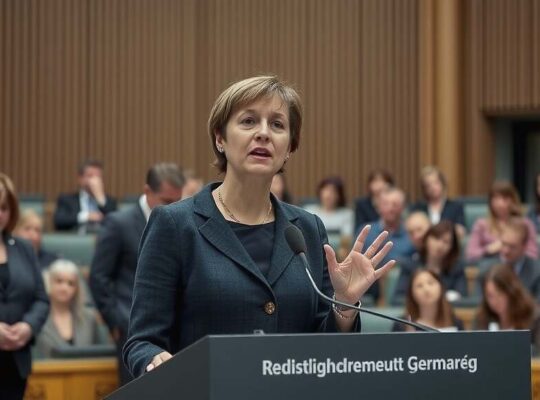The simmering tensions within Germany’s ruling coalition have resurfaced, this time centered on the contentious overhaul of the Bürgergeld (basic income support) system. Johannes Winkel, the prominent CDU parliamentarian and leader of the Junge Union (Young Union), has forcefully rebuked dissent emanating from within the SPD’s grassroots, accusing them of undermining the coalition agreement.
Winkel’s remarks, delivered to “Der Spiegel”, reflect a growing frustration amongst conservative elements within the government. He asserted that continuous challenges to agreed-upon policies, whether concerning pensions or the Bürgergeld reforms, are becoming “irritating”. His words carry considerable weight, given his position as a leading voice within the CDU’s youth wing, often seen as a testing ground for future party leadership.
The backlash stems from a petition gaining traction amongst SPD members, expressing opposition to the planned Bürgergeld reform. The reform, championed by the government, aims to incorporate stricter activation measures and incentivize job searching among recipients. Opponents within the SPD argue the changes are overly harsh and fail to adequately address the systemic issues contributing to unemployment.
Winkel’s criticism of the SPD went further than a simple disagreement on policy. He levied a significant accusation, suggesting the party’s attachment to defending the current Bürgergeld system revealed a “loss of connection to workers”. This implies a widening ideological divide within the coalition, with the SPD seemingly at odds with the concerns and perspectives of the working class – a vital demographic traditionally associated with the party’s support base.
The clash raises fundamental questions about the future viability of the ruling coalition. Winkel’s stark advice – that the SPD should “honestly state” if they are no longer willing to shoulder responsibility for governing Germany – underscores the precariousness of the political alliance. It signals the potential for a significant shift in German politics should the SPD decide to abandon the coalition, leaving the CDU-led government scrambling for alternative partnerships and further complicating the policy landscape. The internal SPD debate over the Bürgergeld reform, therefore, represents more than just a disagreement over welfare; it is a symptom of deeper ideological fractures that could reshape Germany’s political direction.












